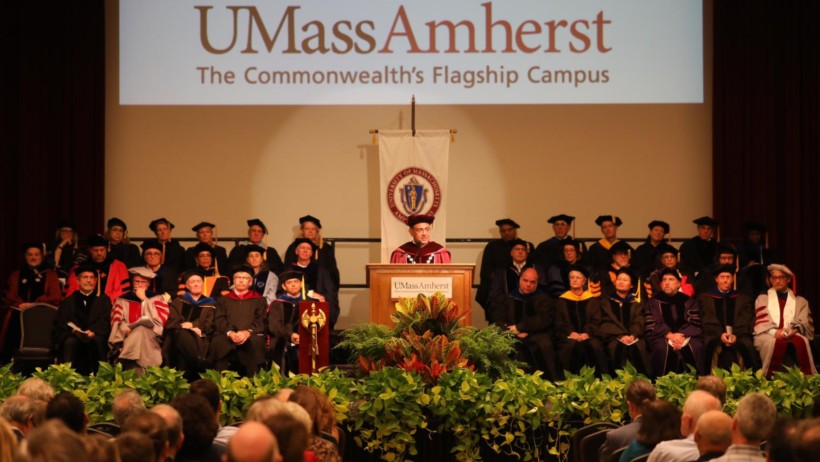AMHERST, MA–UMass Amherst Chancellor Kumble R. Subbaswamy told the 13th annual Faculty Convocation on that the university is committed to academic excellence and access to a world-class education for every qualified Massachusetts student, regardless of their socio-economic status, their race, religion, or their ethnicity.
With the most academically accomplished class just entering the university and a world class faculty in place, Subbaswamy said the time is at hand to “become a Top 20, or even a Top 10 national public university the people of Massachusetts need and deserve.”
“I do not intend for us to chase a ranking, merely for bragging rights … Our campus should aspire to the qualities of the best public universities in the nation when it comes to metrics such as academic rigor, student success, and faculty resources,” he said. Additional public investment and private support will be required to achieve those goals, he said.

He said the two biggest challenges will be expanding the faculty to cope with enrollment growth and dealing with buildings that are “either long past their useful lives or in desperate need of repair.” UMass Amherst’s role as flagship campus remains a necessary investment for the continued success of the commonwealth, he said.
The way to excellence presents many challenges, the chancellor said, but it requires building a thriving and diverse living and learning community that is “not only free of intimidation, but genuinely welcomes minority viewpoints.” He cited the “Hate Has No Home at UMass” campaign as part of a broader campaign to foster that welcoming environment.
Citing turmoil this past summer in in Charlottesville, Virginia and other recent events, the chancellor observed that “we are living in a time when bigotry, intolerance and hatred have found their way into our mainstream social discourse. During these challenging times, it is truly reassuring to know that we can count on each other to stand united against this hatred, as we recommit ourselves to ensuring a safe and welcoming campus community.”
He also emphasized that, “It is up to us as a faculty intentionally to create a learning environment which is not only free of intimidation, but genuinely welcomes minority viewpoints. For only by bringing all perspectives into the discussion and using the rigor of evidence based scholarship and reason will we teach all our students how to seek the truth. Our ability to guide this process is a profound tool, allowing us to make a significant contribution to our students and to civil society.”













